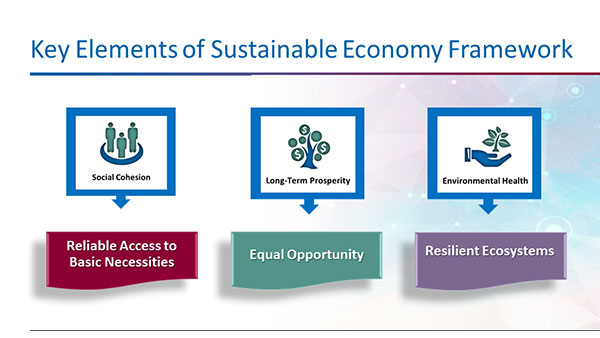The Three Pillars of a Sustainable Global Economy

By Dave Zellner
Chief Investment Officer
July 28, 2020
Wespath is a founding signatory of the United Nations Principles for Responsible Investment and has a long history of work that elevates environmental, social and governance (ESG) integration in the investment process. Now, as ESG topics continue to gain industry attention, we are excited for the next phase of this work—collaboratively building a more sustainable global economy.
We define a sustainable global economy as one that promotes social cohesion, long-term prosperity for all and environmental health. It is our belief that, working together, investors can create and support this economy, which would ultimately deliver healthier financial markets, more resilient companies and greater financial security for our various stakeholders.
The below diagram clarifies the societal outcomes of our key pillars:

Social Cohesion means people around the world have reliable access to necessities, including sustainable food and water, reliable clean energy and safe affordable housing.
Long-term Prosperity describes the concept of equality opportunity—be it equal access to quality jobs and healthcare, or equal opportunity to participate in global financial markets.
The Environmental Health pillar relates to the development of resilient ecosystems and the mitigation of climate change.
Our sustainable economy framework is the foundation for our entire sustainable investing program, but it also drives specific investment activities pointed at one or several of the three pillars. For instance, our Positive Social Purpose Lending Program invests in loans for affordable housing, while our corporate engagements with large oil companies—such as Chevron and Occidental—are focused on the transition to a low-carbon future.
But the framework also gives us a lens with which to view new and emerging topics. A recent example is the ongoing coronavirus pandemic.
As the scope of COVID-19 and related economic uncertainties became clearer, we sought to leverage our existing framework to guide our response. We eventually landed on a multi-faceted plan that includes collaborative shareholder engagement, education and direct engagement with our asset managers—all grounded in addressing the near-term effects of the virus and putting the economy on the path to long-term sustainability (view specific details here).
We know that a “business as usual” response to COVID-19 will be insufficient, and we think the same thing can be said for long-term systemic issues such as climate change or social inequality, as has emerged amid global protests calling for racial justice in recent weeks.
Our vision for a sustainable global economy is ambitious and tackling the systemic challenges it identifies is no easy task. Nevertheless, we believe that investors can collectively transform the world through bold action.
More importantly, we believe the transition to a sustainable global economy can positively impact the returns of our participants and other stakeholders, making it our responsibility as fiduciaries to think creatively about key solutions in a rapidly changing world. The sustainable economy framework provides us with the foundation for finding those solutions in the near and distant future.
But we also want to hear from you! What topics come to mind when you think of our sustainable economy framework? What themes would you like us to cover in future blog posts? Let us know at [email protected].